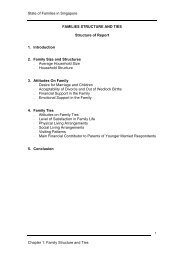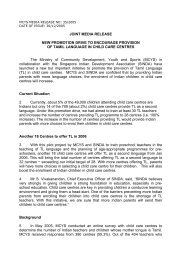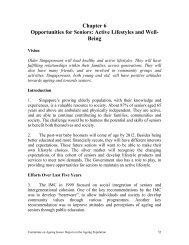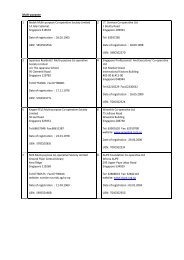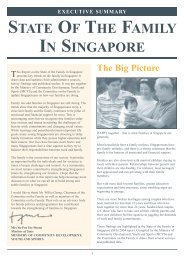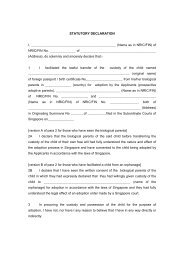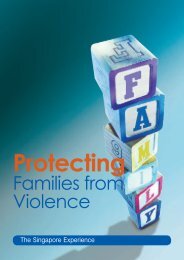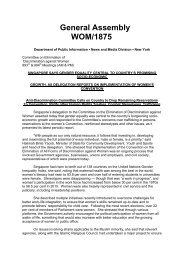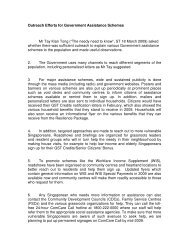A Single Parent Guide - Ministry of Social and Family Development
A Single Parent Guide - Ministry of Social and Family Development
A Single Parent Guide - Ministry of Social and Family Development
You also want an ePaper? Increase the reach of your titles
YUMPU automatically turns print PDFs into web optimized ePapers that Google loves.
page • 12<br />
CUSTODY AND ACCESS<br />
The children will feel the impact <strong>of</strong> the divorce <strong>and</strong> living<br />
in a single-parent family can hurt them. To cushion the<br />
blow, it is important to work out a custodial arrangement<br />
both you <strong>and</strong> your ex-spouse are happy with. This will<br />
make the change easier for your children.<br />
What does "getting custody, care <strong>and</strong> control" <strong>of</strong> my<br />
child mean? Who can get "custody, care <strong>and</strong> control"<br />
<strong>of</strong> my child? What is the difference between "custody"<br />
<strong>and</strong> "access"?<br />
Having custody means that you will have the responsibility <strong>of</strong> making major<br />
decisions in the child's life, such as education, medical treatment <strong>and</strong> religious<br />
upbringing <strong>of</strong> the child. Either you or your spouse may have sole custody <strong>of</strong> your<br />
child. Alternatively, you <strong>and</strong> your spouse may have joint custody <strong>of</strong> your child.<br />
This means that you <strong>and</strong> your spouse will have to make joint decisions on the major<br />
issues in your child's life.<br />
Although both parents may have joint custody, usually only one parent will have<br />
care <strong>and</strong> control. Having care <strong>and</strong> control means that the child will live with you,<br />
<strong>and</strong> you have the responsibility <strong>of</strong> making the day-to-day decisions that affect the<br />
child's life, such as what time he goes to bed at night. Sometimes, care <strong>and</strong> control<br />
<strong>of</strong> the child may be given to a person who is not the child's parent, such as a<br />
gr<strong>and</strong>mother or aunt.<br />
Access is when the non-custodial parent (the parent who does not stay with the<br />
children) gets to see the child.<br />
My ex-spouse isn't letting me see my children even though there is a court<br />
order to let me do so. What can I do?<br />
It is important for you <strong>and</strong> your ex-spouse not to involve your children in your<br />
personal conflicts. Try to talk things over with your ex-spouse. If you have trouble<br />
getting through to him or her, approach a counsellor for help. (See Counselling<br />
services listed on pages 16-18.)<br />
You could also consult a lawyer on the legal steps you can take. (See pages 13-14<br />
for information on getting a lawyer.) If you cannot afford a lawyer, go for subsidised<br />
or free legal counselling services. (See pages 19-21.)<br />
The court has granted me/my ex-spouse access to the children, but the children<br />
don’t want to see me/my ex-spouse. However, both <strong>of</strong> us want the children to<br />
go for access. What can we do?<br />
You cannot force your children to be happy about seeing the access parent. But<br />
you can try to repair the relationship between the access parent <strong>and</strong> the children.<br />
Both parents can seek a counsellor’s help to underst<strong>and</strong> how your children may be<br />
feeling <strong>and</strong> how to help them adjust. The custodial parent can facilitate access by<br />
actively encouraging the children to meet the other parent. You can also get them<br />
to meet a counsellor who will talk to them <strong>and</strong> help them deal with the divorce.<br />
(See Counselling services listed on pages 16-18.)



